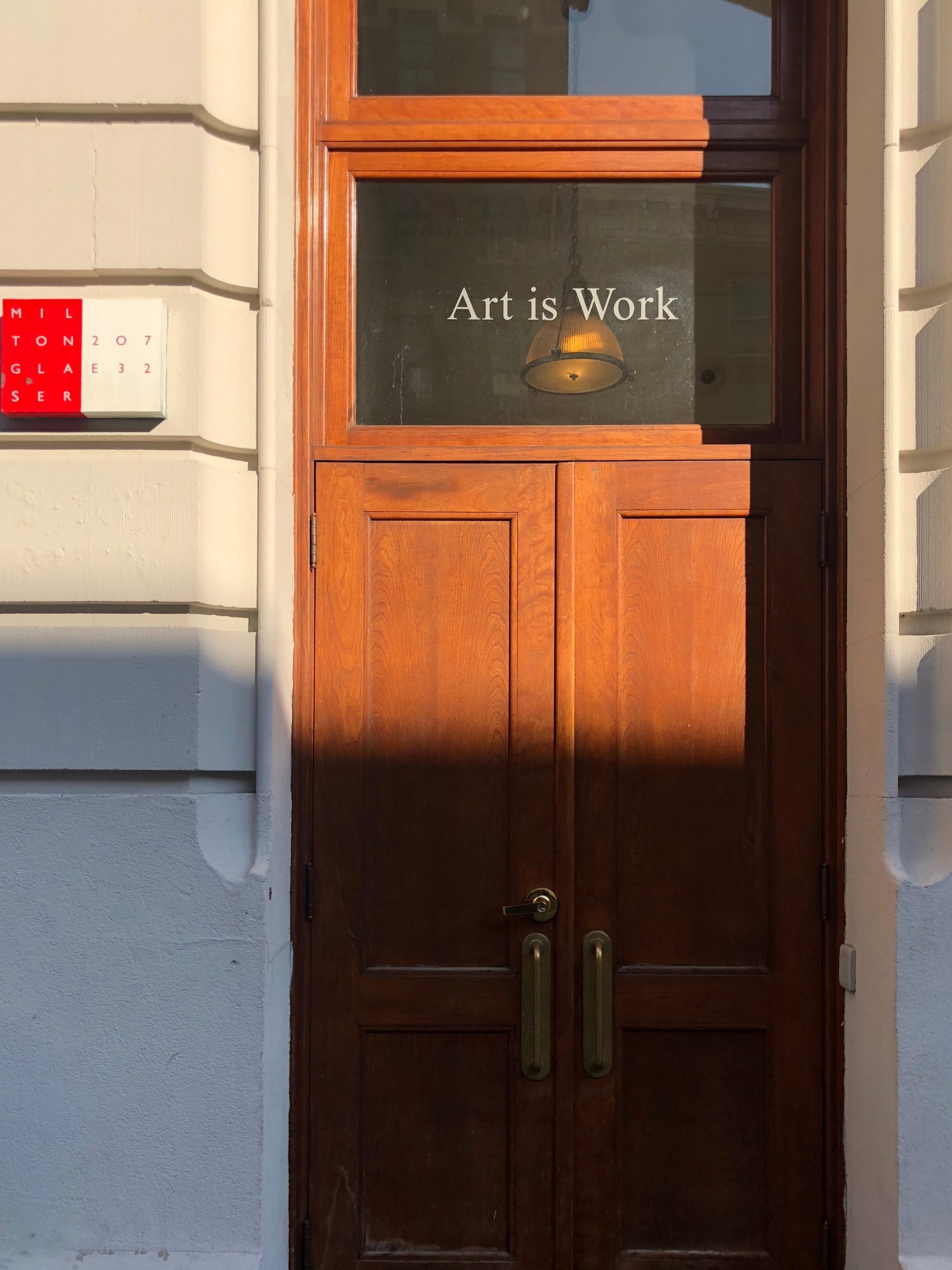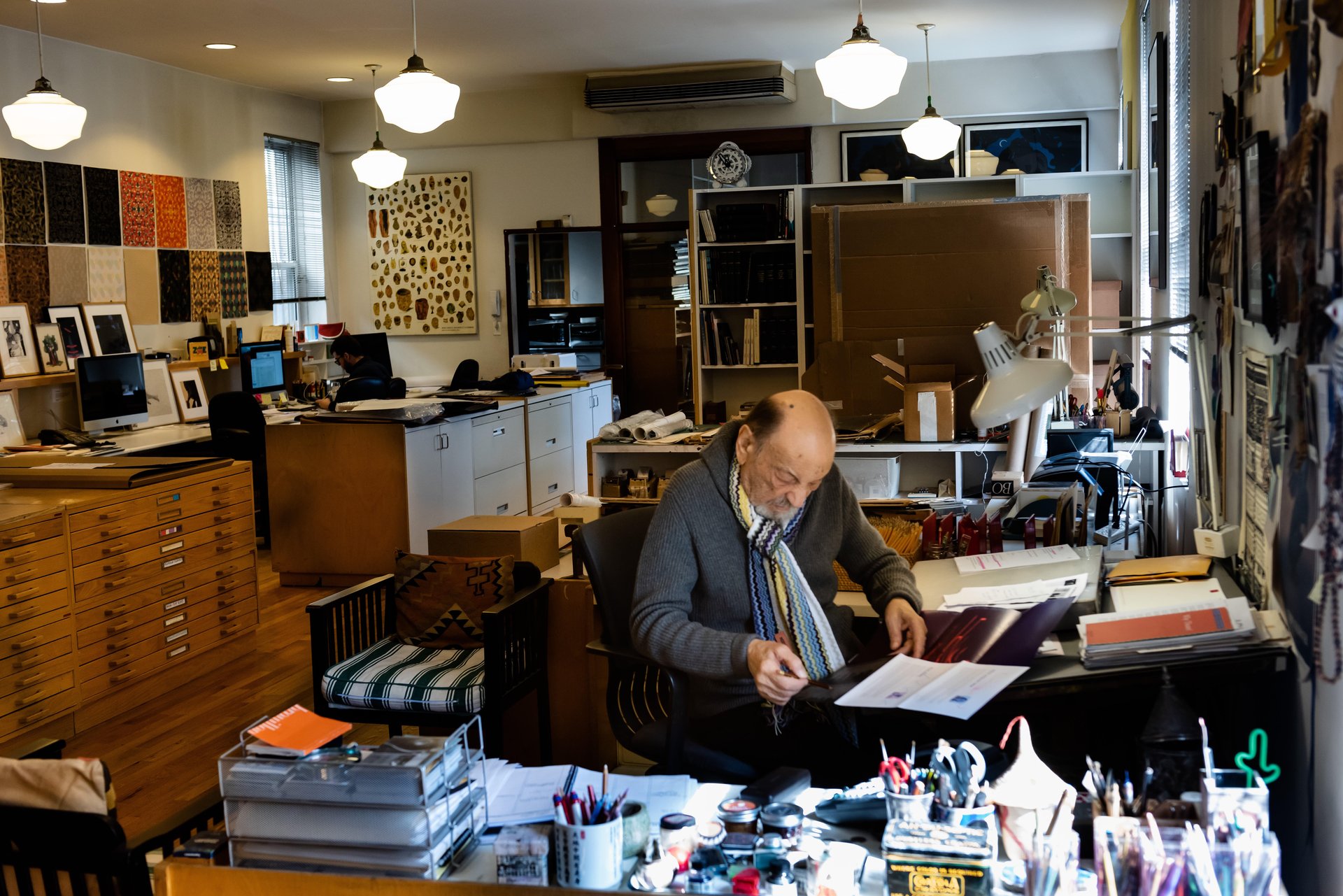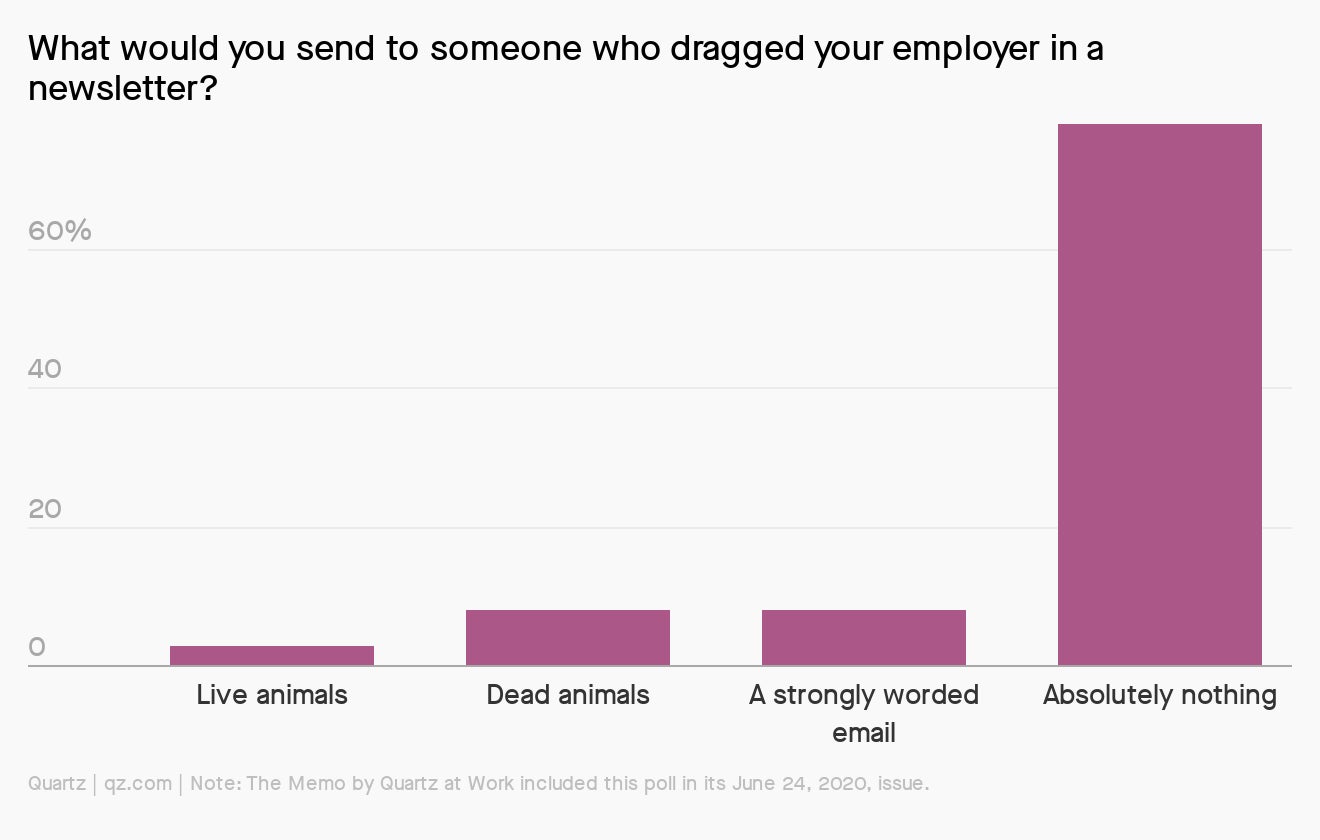The Memo: The design of a career measured in decades
To modern workers everywhere,

To modern workers everywhere,
Milton Glaser, creator of the “I ❤️ NY” logo and a world of design projects, died on Friday, June 26—fittingly, at the end of the workweek. Aside from being an erudite practitioner and philosopher of design, he was the most joyful workaholic I’ve met.
Rejecting retirement, Milton demonstrated into his 90s how our careers can be infinite founts of vitality. He had countless aphorisms about work: “Work only for only the people you like,” “Embrace interruptions, they will make you feel more productive,” and “Art is work,” the latter of which is stamped over the front door to his studio in New York City. For him, each project offered the possibility of creating something transcendent—something more than the client imagined.

“I have a secret,” he wrote in a 2018 book about his poster-design work. “All my life I’ve wanted my work to go beyond professionalism and enter the world of art. Every time I get a poster assignment, I hope that after I solve the client’s problem, I might be able to solve mine. Persian rugs and Chinese ceramics, among many other things, prove it’s possible.”
Working with him on a book about magazine design, and later while exhuming 50 years’ worth of project files for his “last big book” that we had begun writing, I witnessed how much Milton cherished every aspect of the workday—especially lunch. If he wasn’t meeting a friend at a restaurant, he delighted in gathering everyone in the office to confer on the important decision of where to order from. “What looks amusing?” he would often say, eyeing menus on Seamless. (In the 1970s, he managed to turn his midday breaks into a joyful work assignment, co-writing the New York magazine column “Underground Gourmet” with his friend Jerome Snyder.)
While many of us are freshly negotiating work-life balance for extended remote-work arrangements, Milton proved how these realms perhaps don’t need to be in opposition. In his later years, work even became life-giving. In recent months, he was working from rehab on a graphic treatment of the word “together,” to remind us of our sense of connectedness during months of isolation. The last time we spoke on the phone, he was excited about the prospect of setting up a home office.
Even during the tedious hours strapped to a dialysis machine or lying in a hospital bed, his curious mind kept churning, and dreaming, fueled by the idea of getting back to his studio.—Anne Quito

Five things we learned this week
Leading in isolation can make you a more present CEO. SailPoint co-founder Mark McClain found the adjustment to remote work both jarring and humbling. In this piece, he offers advice to other leaders about what he’s learned in the process.
How to find your company’s “water carriers.” Visier’s Ryan Wong has long made an effort to identify the hard workers who hold things together with no drama or fuss. Water carriers are easily overlooked, but Wong offers multiple ways to find them and make them feel valued.
Women get kinder, less honest feedback at work. New findings by psychologists at Cornell University are perhaps “just one small piece of a bigger puzzle about why women aren’t advancing quickly towards parity in areas like power or pay,” Quartz at Work’s Cassie Werber suggests.
There’s a new XPrize for reskilling displaced workers. The organization that helped launch the private space industry has backed a $6 million competition, in concert with MIT and New Profit, to incubate ideas for rapidly training 25,000 displaced workers and putting them in living-wage jobs as quickly as possible. Quartz at Work’s Anne Quito has the details.
Our regrets about our work are rarely as severe as Wendell Potter’s. Quartz at Work’s Lila MacLellan reports on the latest mea culpa of a former Cigna executive turned health-insurance industry whistleblower and explores what it takes for people to make such a radical break with their past.
30-second case study
SoBi, the bike-sharing company, was the kind of socially conscious firm that drew loyal, idealist employees. It launched in 2010 and grew slowly, operating on a shoestring and working closely with cities, communities, and urban designers to find the most effective and inclusive schemes to introduce new bikes and docks. Then, in 2018, it was bought by Uber and renamed JUMP.
Talk about a culture clash. As journalist Aaron Gordon writes in this deeply reported piece for Vice, when urban mobility took off as an investment, former SoBi employees were suddenly working for a cash-rich company and competing with Chinese and domestic firms pouring hundreds of millions of dollars into bike-sharing. The idealists lost control of their vision for better micro-mobility; and JUMP bicycles, which could be docked without being locked to anything, became targets for thieves and vandals. Early last month, Uber sold the struggling business to Lime, the electric scooter-sharing company, and laid off most of the division’s employees.
The takeaway: Some missions can’t be rushed. “Uber was running JUMP with the mindset that anything that’s broken can be patched,” Gordon writes, “but, as one employee put it, ‘a firmware update can’t fix a bike chain.’” Uber was only part of the problem, though. Cities, too, jumped at the chance to let businesses “solve” a social question. What stung JUMP employees under Uber most, Gordon argues, was “the gradual erosion of everything that got them to sacrifice so much for the company in the first place.”
A surprising discovery
When millennials and then Generation Z entered the workforce, they didn’t seem to be huge fans of 9-to-5 office life. These generations, which had grown up with mobile technology, knew they could easily work from a café or couch, or a beach town far from the city. They demanded more flexibility, ranging from four-day work weeks to remote-work options.
So it may come as a surprise that the workers who miss the office most in the Covid-19 era are the youngest cohorts. In a June survey of 3,000 workers by real-estate giant JLL, 65% of workers under 35 said they missed the office, compared to 58% of workers overall. Cassie Weber explains why.
A quick poll recap
We asked last week and you answered.

So apparently a small handful of you might be counted on to send, say, live cockroaches or pig fetuses, as detailed in the charges now faced by six former eBay employees. As for the rest of you, we see your apathy—and we sincerely appreciate it.
Words of wisdom
“Growing up in Asia, I was surrounded by the colonial idea that success is defined by your proximity to the West. My classmates and I internalized the message that developed countries are our ticket to happiness, even if we’re not welcomed there.”—Nayantara Dutta, an Indian expat in the US until recently, in a Quartz at Work article on how she’s working to find happiness outside of America.
✦ Special to Quartz members ✦
“Public transit has two big functions and you can look at it from two sides of the spectrum: On a very cynical neoliberal side of the spectrum, you can say public transit is a funnel for workers to get from lower-income areas into their office buildings so that they can serve capitalism. On the very other side of the spectrum, you can say public transit is the thing that makes opportunities accessible to everyone in a very equitable way. You’re not constrained by how far away you live from something or whether you can walk, whether you can afford to own a car. Anyone can get to anything.
“Both things are true. It’s vital both for both of those reasons.”
Alexis Perrotta, a lecturer at City University of New York, is just one of the many academics, researchers, commuters, and cycling enthusiasts we spoke to as part of our latest field guide, about the urban commuting revolution taking shape around the world as a result of the coronavirus pandemic.
Not a member yet? Subscribers to The Memo can get 50% off the first-year Quartz membership price of $99 by using the code QZSUMMERSALE. Sign up for membership and support our journalism.
ICYMI: The Science of Decision Making
Our latest Quartz at Work (from home) workshop brought together a panel of experts in neuroeconomics, psychology, and leadership, to help us understand what our brains are negotiating behind the scenes as we make big choices amid stress and ambiguity. Here are just a few of the takeaways:
- Don’t be over-reliant on intuition.“[M]ost people are not as intuitive as they think … [and it] accounts for many of the mistakes and problems we have in everyday life.”
- Beware the impact of stress on your ethical judgment. “Specifically the stress of not being socially connected also can lead to unethical behavior because we become more insular and are prompted less to think about others.”
- Age has been scientifically linked to risk tolerance. Does this mean your age can make you more or less suitable as a leader? Not necessarily. “As an executive or a decision maker for large groups, you want to say, ‘Well, what is the target risk attitude I need under these circumstances?’ It doesn’t necessarily have to be yours.”
+ Quartz members can access a full recap and the complete video playback of last week’s workshop here. Find replays of all of our Quartz at Work (from home) events here.
You got The Memo!
Our best wishes for a productive and creative day. Please send any workplace news, comments, Milton Glaser appreciations, and socially conscious bike shares to [email protected]. Get the most out of Quartz by downloading our app and becoming a member. This week’s edition of The Memo was produced by Heather Landy, Sarah Todd, and Lila MacLellan.